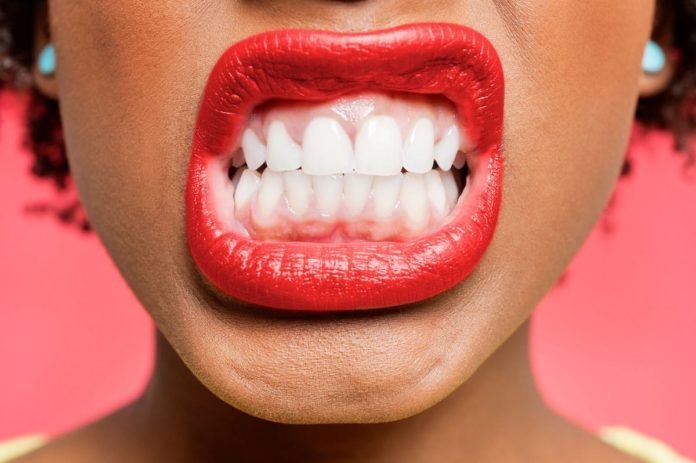You’ve probably caught yourself clenching or grinding your teeth on occasion. Interestingly, it’s thought to affect three times more women than men, mostly between the ages of 20 and 40. However, it’s not limited to that demographic.
Whether you do it when sitting in traffic, deep in thought, or even during your sleep, teeth grinding (also called bruxism) is a fairly common habit. In fact, it’s been found that many people tend to do it when they’re getting some shut-eye (referred to as sleep “bruxism”), often unaware they’re even engaging in this action until certain health problems arise.
Here are six health issues that typically develop in when you grind your teeth routinely, along with tips for combating this problem.
1. Tooth Sensitivity
Because you’re frequently putting pressure on your teeth, you’re causing tooth enamel to wear away. Think about a fabric or surface that you often touch or rub; odds are, it shows signs of wear and tear due to repeated activity in the same spot. Teeth erode in a similar way, and both sensitivity and decay can occur as the enamel becomes more worn down. This is not only uncomfortable—especially when eating certain foods or drinks—but it can ultimately require costly dental treatment to build up lost portions of teeth or to fix decay.
2. Chipped or Fractured Teeth
Repetitive wear and tear not only reduces tooth enamel, but can also cause chips or fractures in your teeth. In some instances, the destroyed section of tooth may be very small or hardly noticeable at first. However, if left untreated, a chip or fracture left can cause more tooth surface to be affected. Fractures may worsen, or more of an already-chipped tooth could break. All of this translates to possible pain, the inability to chew with the affected teeth, and potentially expensive dental procedures.
3. Damage To The Jaw Joint
Those who grind their teeth excessively may develop—or already have—something called temporomandibular joint disorder or dysfunction (TMJD), which refers to serious wear on the jaw joint. You may hear a popping or cracking sound when you open your mouth. Typically opening it wide to yawn or take a large bite of food can trigger the sound, but some even notice it such sounds when chewing food or talking.
Regardless of when cracks and pops occur, they could be an indication of teeth grinding. If left unexamined by a dentist or another medical professional, the damage may become serious enough to cause extreme pain, changes to proper teeth alignment, and even osteoarthritis.
Must Read: Can Exercising Damage Your Teeth?
4. Headaches
Sleep bruxism is very likely to cause headaches, especially upon waking. You may also experience intermittent headaches throughout the day. Tension-type headaches round the temples are the most common, because facial muscles and jaw joints endure constant stress.
5. Facial Pain
Continual teeth grinding can also lead to a facial pain or soreness in very specific areas, including the eyes and ears, and it may even lead to nasal congestion. In certain cases, a physical therapist or orthodontic devices may be necessary to alleviate the pain and help correct the problem. Sometimes, simply taking aspirin may do the trick.
6. Disturbed Sleep
Some people have been known to wake themselves up while grinding their teeth. This actually happened to me several years ago, when I was experiencing extreme personal stress. Fortunately, my sleep bruxism stopped, but for those who wake themselves up every night may never get adequate amounts of sleep thanks to the constant interruptions. As a result, they can feel restless, experience anxiety when trying to fall asleep, and are often fatigued.
Of course, these health issues may not necessarily be related to teeth grinding or clenching—they could be indicative of another health problem. Therefore, if you have persistent headaches or experience jaw pain when talking or eating, be sure to check with your doctor to determine if it’s due to teeth grinding or another underlying issue.
Tips to Help Stop Teeth Grinding
To help reduce teeth grinding, experts suggest minimizing stress, since it’s is often thought to trigger the habit. Creating a calm home or work space, listening to soothing music, taking some extra “me time” and refraining from associating with negative, energy-zapping people are all ways to reduce stress levels and possibly help stop your teeth grinding.
TMJ experts also suggest not drinking caffeinated beverages, not smoking, and avoiding alcohol (especially in the evening). Although no one key factor is associated with all cases of bruxism, it’s thought that things like nicotine, caffeine and alcohol exacerbate the problem by triggering anxiety and central nervous system disturbances.
Of course, you should also be sure to get regular dental checkups so that any changes to your teeth and jaw can be observed, and so you can determine a course of action that fits your needs.








